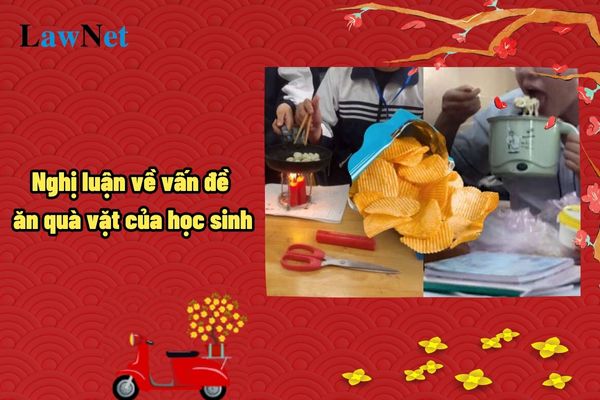What are the 02 sample argumentative essays on students' snacking? What are the duties and rights of lower secondary school students in Vietnam?
What are the 02 sample argumentative essays on students' snacking?
6th-grade students can refer to the following 02 sample argumentative essays on students' snacking:
|
02 sample argumentative essays on students' snacking
|
*Note: Information is for reference only./.

What are the 02 sample argumentative essays on students' snacking? What are the duties and rights of lower secondary school students in Vietnam? (Image from Internet)
What are the duties and rights of lower secondary school students in Vietnam?
Under the provisions of Articles 34 and 35 of the Charter issued together with Circular 32/2020/TT-BGDDT, lower secondary and high school students have the following duties and rights:
(1) Duties:
- Learn and train according to curricula and education plans of their schools.
- Respect their parents, officials, teachers and staff of their schools, and those older than them; maintain solidarity and mutual support in learning and training; conform to the charter and rules of their schools; and abide by the law.
- Take exercises and maintain personal hygiene.
- Participate in group activities of their schools and classes, Ho Chi Minh Young Pioneer Organization and Ho Chi Minh Communist Youth Union; help their families, join physical and social activities and environmental protection activities, and maintain traffic order and safety.
- Protect school and public property; contribute to fostering, preservation and enhancement of school traditions.
(2) Rights:
- Receive comprehensive education with fairness, be provided with time, facilities, hygiene and safety to learn in class and self-learn at home, be informed of their education and training, and be able to use learning, cultural and sport equipment of their schools as per the law.
- Receive respect, protection and fair and democratic treatment, complain to their schools and education authorities about decisions concerning themselves; transfer school with legitimate reason as per existing regulations; enter school before the compulsory starting age, skip a grade and study at an age higher than the compulsory attendance age according to regulations in Article 33 of this charter.
- Participate in activities for development of their gifts in academic subjects, sports and art organized by their schools if able to.
- Students eligible for social benefits, disadvantaged students and gifted students may receive sponsorship or other benefits as per the law.
- Transfer school if eligible according to regulations following school transfer procedures stipulated by the Minister of Education and Training.
- Enjoy other rights as per the law.
What are the responsibilities of the principal in assessing lower secondary school students in Vietnam?
According to Article 18 from Circular 22/2021/TT-BGDDT, the principal's responsibilities are as follows:
Responsibilities of principals
1. Manage and instruct teachers, staff, and students on how to implement and inform students’ parents about this Circular.
2. Organize student assessment as per this Circular in education institutions; direct, examine, and supervise regular assessment and periodic assessment implemented by teachers; on a monthly basis, record feedback and countersign in student monitor and assessment records (by classes).
3. Examine and assess recording of results into student monitor and assessment records (by classes), student monitor and assessment records (of teachers), and Education records of subject teachers, class advisors; allow subject teachers to revise score and/or assessment after obtaining verification of class advisors.
4. Organize re-examination and re-assessment of subjects according to Article 14 hereof; approve and publicize list of students eligible for class advancement once re-examination and re-assessment results of subjects during summer break are available.
5. Approve lists of students: eligible for class advancement, re-assessment in each subject, training during summer break, class retention, and commendations. Approve student assessment results in student monitor and assessment records (by classes) and Education record once all subject teachers and class advisors have filled in relevant contents.
6. Explain and deal with difficulties and propositions regarding student assessment within rights and powers of principals. Request competent authority to take actions against violating agencies, organizations, and individuals; issue commendation decisions within their competence, request competent authority to commend agencies, organizations, and individuals with merits in implementation hereof.
Thus, in managing the student tracking and assessment books for lower secondary school students, the principal has the following responsibilities:
- On a monthly basis, record feedback and countersign in student monitor and assessment records (by classes).
- Examine and assess recording of results into student monitor and assessment records (by classes), student monitor and assessment records (of teachers)
- Approve student assessment results in student monitor and assessment records (by classes).

